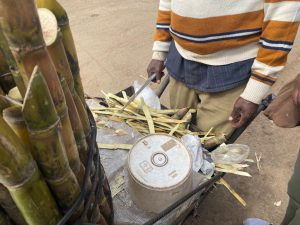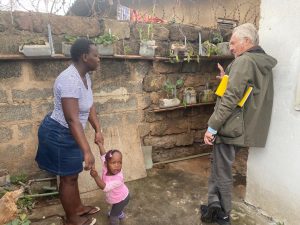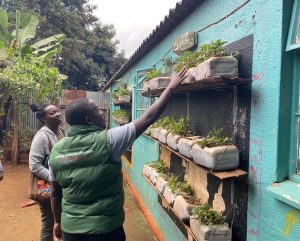While in the U.S. plastic grocery bags are ubiquitous in almost every household, you won’t find them here in Kenya. In 2017, the Kenyan government banned all single-use plastic carrier bags for retailers. This means that in the local QuickMart, Carrefour, or Foodplus grocery stores, your groceries are bagged in reusable shopping bags, which are sold to you at a small fee. A small price to pay for a big impact.
Unfortunately, the use of single-use plastic carrier bags did not immediately cease following the ban. According to the Kenyan government’s assessment of compliance, only 80% of individuals complied with the ban in 2019, rising to 95% in 2021. Organizations such as the Kenyan Association of Manufacturers opposed the ban on the grounds that it would eliminate jobs. Even today, you are still able to spot the plastic bags across Nairobi, as I did last Saturday in Kibera.
In Nairobi’s informal settlements, vendors are able to slip under the radar. A 2019 study found that only 30% of those interviewed in Kibera supported the ban on plastic bags, compared to 60% in the affluent Nairobi suburb of Karen. While conducting site visits to Shield of Faith members’ homes last weekend, Stella, Iain, and I stopped to purchase sugarcane from a local vendor. I was surprised to find that the vendor was using plastic carrier bags, having not seen a plastic bag since I arrived in May. Stella, unfortunately, was not surprised. She commented that bags such as the ones pictured below are often illegally brought into Kenya from neighboring Tanzania. In Kibera and the other informal settlements, these bags often end up strewn along the side of the road or in the massive waste heaps where residents dispose of their household garbage. More action is needed by all stakeholders to eliminate these bags.
The improper use and disposal of plastic bags have countless environmental consequences, with one of the most pressing being the consumption of plastic by animals and subsequent contamination of the food supply. Just this year, the Kenyan public interest group Centre for Environment Justice and Development found extremely high levels of persistent organic pollutants (POPs) in chicken eggs, with levels higher than 111 times the EU regulatory amount. Similarly, the body found that a Kenyan adult eating a chicken egg from certain hotspots, including Nairobi’s Ngara Market, “could be exposed to a dose of toxic chemicals that would exceed the EU daily safety limit for more than 250 days.”
Shield of Faith stands at the forefront of this issue by promoting a culture of recycling and proper waste management in Kibera. Making expert use of 5-litre jerry cans, formerly used to store soap or oil, Stella reuses the containers to create planter boxes and tower gardens for growing fruits and vegetables. In fact, most of Shield of Faith’s members reuse 5-litre jerry cans in their gardens one way or another. With such high demand among Shield of Faith’s 20 members, Stella purchases empty jerry cans from local restaurant owners and housekeepers, thus inviting them into the project as indirect beneficiaries. Gradually, each one of the project’s direct and indirect beneficiaries becomes more conscious of their plastic use and encourages recycling in their own households and those of their neighbors. One restaurant owner in Kibera, Quinter, saves up her jerry cans for Stella to purchase. In the end, Quinter earns a few hundred shillings, Stella gets her jerry cans, and plastic that would have likely been dumped in Kibera’s trash heaps is instead used to grow something beautiful.
Posted By Caitlin Mittrick
Posted Jul 18th, 2023




